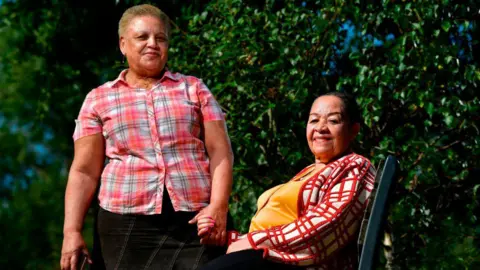Belgium ordered to pay reparations for colonial kidnappings in Congo
Vocabulary: 200, Words: 412

1A Belgium court has ordered the government to pay reparations to five mixed-race women who were forcibly removed from their families in the colonial-era Belgian Congo.
2The women, now in their 70s, were taken from their mothers when they were young children and placed in orphanages under a state policy.
3The court said the government had a "plan to systematically search for and abduct children born to a black mother and a white father".
4On Monday judges called this a crime against humanity and said the kidnappings were "an inhumane act of persecution".
5The Belgium government in 2019 issued a formal apology to an estimated 20,000 victims of forced family separations in DR Congo, as well as Burundi and Rwanda.
6DR Congo was governed by Belgium as a colony from 1908 to 1960.
7Monique Bitu Bingi, Léa Tavares Mujinga, Noëlle Verbeken, Simone Ngalula and Marie-José Loshi launched a legal case for compensation in 2021.
8They were all taken by the state under the age of seven and placed in orphanages mainly managed by the Catholic Church.
9Bitu Bingi had previously told AFP news agency: "We were destroyed. 10Apologies are easy, but when you do something you have to take responsibility for it."
11Their legal fight succeeded on Monday in the Brussels Court of Appeal which overturned an earlier court's ruling which found too much time had passed for them to be eligible for reparations.
12As the court ruled the state's actions a crime against humanity, this removed any statute of limitations.
13"The court orders the Belgian State to compensate the appellants for the moral damage resulting from the loss of their connection to their mother and the damage to their identity and their connection to their original environment," the judges said.
14The women had asked for an initial payment of €50,000 (£41,400).
15This is the first case in Belgium to have highlighted the estimated 20,000 children born to white settlers and local black women who were forcibly removed from their families during the 1940s and 1950s.
16Most white fathers refused to recognise their mixed-race children or acknowledge paternity, and the children also did not automatically receive Belgian nationality.
17As such they were taken into state care and placed in Church-run orphanages, where in many cases they endured further abuse.
18In 2017, the Catholic church apologised to the victims for its part in the scandal.
19And in 2019, the Belgian government apologised for its involvement as part of a "step towards awareness and recognition of this part of our national history".
from BBC